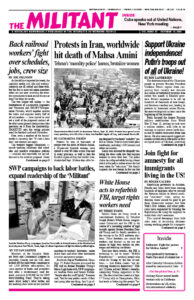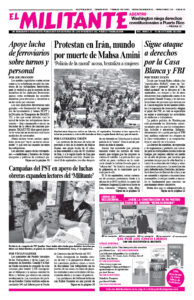On April 26, 1986, an explosion blew apart the top of reactor No. 4 at the Soviet nuclear power plant in Chernobyl, in Ukraine, releasing huge amounts of radiation into the atmosphere. More than 2,000 square miles of Ukraine, Belarus and Russia were contaminated, with clouds of radioactive dust reaching Sweden and other countries.
The disaster was caused by Stalinist misrule and contempt for working people. Soviet officials had decided to build the reactor without a containment structure or other safety features that would have impeded a release of radiation. When the reactor exploded, Moscow did all it could to cover up the disaster. It delayed evacuating people from the area and showed total indifference to the lives of hundreds of thousands of workers and soldiers joining efforts to contain the leaking reactor and clean up the area.
The Cuban government’s response to the nuclear meltdown and its devastating effects on Ukraine’s population, especially the children, shows the proletarian internationalism of Cuba’s socialist revolution. Strong ties were knit between working people of the two countries.
In contrast to the Stalinist regime’s cover-up, Cuba’s revolutionary government rapidly responded with offers of support and help. Cuban doctors visited cities and towns in Ukraine, including areas where there were no doctors because they had fled to avoid possible radiation to themselves.
The Cuban government then offered to provide free medical care in Cuba to victims of Chernobyl. When the first planeload of nearly 140 children arrived in Havana on March 29, 1990, leaders of the Cuban Revolution, including President Fidel Castro and Vilma Espín, president of the Federation of Cuban Women, were on hand to greet them.
Castro asked one of the young women accompanying the children how many people had been affected. She said there were as many as 100,000. Castro conferred on the spot with other government representatives. Hours later, before the second plane arrived, he announced that Cuba would take 10,000 children. The program ran through 2011, with doctors treating more than 25,000.
Tarará medical facility
To carry out this project, 7,000 Cuban volunteers joined work brigades that over the course of three months helped transform the seaside Tarará youth camp into a center for medical care and rehabilitation for children coming mostly from Ukraine, but also Belarus and Russia in the beginning.
This took place as the Soviet Union was coming apart — the inevitable result of counterrevolutionary Stalinist rule. Ukraine announced its independence in 1991.
Cuba found itself confronting the loss of 85% of its foreign trade and all Soviet aid, leading to what was called the Special Period. This resulted in serious hardship for the Cuban people. But the medical personnel caring for the Chernobyl children — backed by Fidel Castro and the revolutionary government — put a priority on making sure the children continued to get everything they needed.
From the get-go, the medical program was the target of political attacks by Washington. Slanderous articles in the capitalist media claimed that with scarcity and hunger in Cuba there was no way the government could feed these children.
This program “became a part of our lives,” Dr. Julio Medina, director of the Pediatric Hospital of Tarará who was in charge of the program, told the Militant in an interview in Havana in 2014. “We could say that living more than 20 years with Ukrainians almost made us feel Ukrainian, think like Ukrainians. It’s part of our lifestyle, our foods, our likes, and customs,” he said. “Likewise they took our food and customs home with them. They loved to dance to Cuban music.”
While getting medical care, children were organized to participate in a number of cultural activities, Medina said. And for those who needed treatment for long periods, the government established a school for the children, staffed by Ukrainian teachers.
When Militant editor John Studer went to Ukraine after the Maidan uprising overthrew the pro-Moscow government of Viktor Yanukovych in 2014, he met with a group of young women who had been treated at Tarará, as well as one of the women who organized their travel from Ukraine and was on the first plane to take them to Cuba. They said they consider Cuba their “second home.”
The program was suspended in 2011 when the Ukrainian government stopped paying transportation costs for the children. Cuban officials have said they would like to see the program resume, and groups in Ukraine, including those Studer met with, would like to see this happen.
A good way to get more information about this program is to watch the documentary “Cuba and Chernobyl,” which was produced in Cuba and broadcast on national TV there in 2006. The Militant translated it and added subtitles. It can be viewed on themilitant.com website. A DVD can be ordered from the Militant, 306 W. 37th St., 13th floor, New York, NY 10018.

